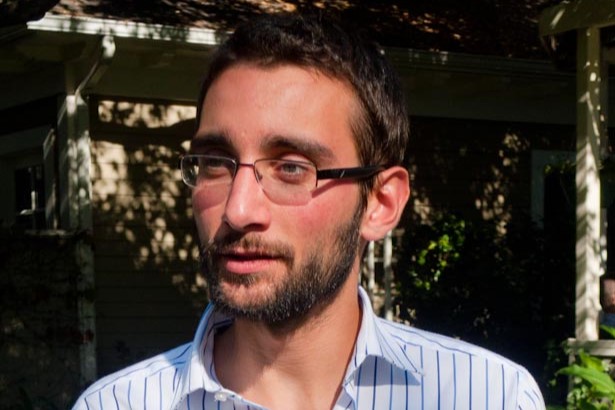- Louis-Philippe Beland
- Zhiqi Chen
- Ba M. Chu
- Ana Dammert
- Dana Galizia
- Till O. Gross
- Christopher M. Gunn
- Lynda Khalaf
- Hashmat U. Khan
- Minjoon Lee
- Maya Papineau
- Simon Power
- Raúl Razo-Garcia
- Gaëlle Simard-Duplain
- Matthew Webb
- Lanny Zrill
Our award winning faculty have received Tri-Council (SSHRC, NSERC, and CIHRC) grants, Canada Research Excellence Chair positions, research achievement awards, teaching awards, and other grants.

Louis-Philippe Beland
Public Affairs Research Excellence Chair (Assistant level)
Professor Beland uses sound research designs to provide insight into important public policy issues touching public and labour economics. One of his research interest is externalities to traffic. Congestion levels have been increasing in most urban cities in Canada and the United States. The most obvious reason that traffic congestion is increasing widely is population growth. This is a serious concern since congestion levels are expected to continue to increase.
In his research, Professor Beland has documented various externalities to traffic, including the negative emotional cues associated with unexpected high traffic and its link to domestic violence. He also documented the cost of traffic on the work of first responders. His work shows that traffic slow down the time of arrival to an incident and show serious consequences. Some of his future work will study additional costs of traffics.
2022 SSHRC Insight Grant
Determinants of Health
This research project encompasses several distinct studies aimed at investigating various factors affecting health capital and their subsequent impact. The first paper delves into the effect of governors’ political parties (Democrat vs. Republican) on infant health outcomes in the U.S., examining the outcomes by various demographic factors. The second paper explores the impact of police violence on infant health outcomes in the U.S., particularly focusing on in utero exposure to police-involved shootings. The third paper analyzes the introduction of opioids on traffic fatalities and infant health outcomes in the United States, utilizing cross-state variations in OxyContin’s entry and marketing policies. Each study contributes to our understanding of how policy and politics shape health capital and, subsequently, human capital.
2020 SSHRC Insight Development Grant
Traffic, Judges and Immigration Decisions
This research project aims to investigate the economic consequences of traffic congestion, specifically focusing on whether morning traffic affects the productivity of judges in the United States and their immigration adjudication decisions. The study builds on existing research demonstrating that judges can be influenced by various emotional cues, such as significant events or external factors. Additionally, it recognizes the growing body of literature linking traffic congestion to negative mental health outcomes, including stress and aggression. The project intends to combine immigration adjudications with local traffic data in California from 2008 to 2015 to analyze the impact of unexpected high traffic faced by judges during their morning commute. By examining deviations from a judge’s usual traffic patterns and considering various judge characteristics, the study seeks to uncover whether traffic congestion affects judges’ productivity and the outcomes of immigration decisions. The research aims to shed light on an understudied aspect of traffic’s impact on work productivity, which is particularly relevant in urban areas, and may have important policy implications for traffic management.
Zhiqi Chen
2019 SSHRC Insight Grant
Consumer Protection in the Age of Internet Commerce and Big Data
Last year, Canadians spent more than one billion dollars online. But along with that growth comes an increase in the commercial use of personal data and misleading pricing practices by Internet retailers.
Professor Chen has received $72,950 from the Social Sciences and Humanities Research Council to look at consumer protections within the e-commerce marketplace. He intends to conduct an analysis of the interactions between the collection and use of personal data by Internet firms and consumer’s privacy concerns, with the assumption that “privacy has intrinsic value which differs among consumers.”
Ba M. Chu
2020 NSERC Discovery Grant
Simulation-based Methods for Large Dynamic Latent Variable Models with Unobservable Heterogeneity
Professor Ba Chu has been awarded a $90,000 grant from the Natural Sciences and Engineering Research Council of Canada (NSERC) for his study entitled “Simulation-based methods for Large Dynamic Latent Variable Models with Unobserved Heterogeneity.” The grant will be distributed over a five-year period.
“In science and engineering, one often needs to study the behaviour of complex dynamic systems through latent variable models. Most of the time, the systems under study are large,” wrote Chu, citing global-scale numerical weather prediction in one example. “Current research endeavours should be focused on creating new methods with high scalability to estimate these large-scale latent variable models. In this proposal, I propose a new research agenda in this direction, which builds upon my recent work in time series and panel data econometrics.”
Chu notes that applications of latent variable models with time series/panel and network data are ubiquitous in many areas, including econometrics, biology, ecology, epidemiology, neuroscience, signal processing, and various fields.
Ana Dammert
2023 Department of Economics Research Support Award
2022 International Research Seed Grants, Office of the Associate Vice-President (Research and International)
2021 Faculty of Public Affairs Bursary Research Grant
Dana Galizia
2022 SSHRC Insight Grant
Unemployment Risk, Self-Insurance, and the Business Cycle
Standard economic theory predicts that workers have an incentive to put aside “rainy day” savings for use if and when they become unemployed. One implication of this is that if workers’ fears of becoming unemployed increase, they will reduce their spending on goods and services (“tighten their belts”) so as to increase these savings. This cut in consumer spending may then in turn cause or exacerbate a business cycle downturn. This research project aims to understand how important this mechanism actually is in the real world, and what the implications are for optimal macroeconomic policy.
2019 SSHRC Insight Development Grant
Emergent Behaviour in Macroeconomics
What causes the booms and recessions that make up the business cycle? Although economists have devoted years of research on this question, there is no consensus on the answer.
A key challenge facing researchers is the complexity of the economic system. Economists rely on theoretical models to help them, but business cycle models, reflecting complex phenomena, are themselves generally complex and often are not fully understood.
Professor Galizia, will use a $32,530 grant for a research project developed to improve our understanding of one of the key features of many existing models: why and where do reasonable individual-level decisions made by economic agents interact in such a way as to produce outcomes that are at odds with those agents’ goals?
Till O. Gross
2022 SSHRC Insight Development Grant
Innovation-driven Growth in a Multi-country World
The groundbreaking, Nobel-award work of Romer (1990) suggested that policy decisions could have a sizable impact on the long-run growth rate. However, the work by Jones (1995a,b) and later Bloom et al. (2020) cast considerable doubt on the applicability of Romer’s model. We develop a multi-country model of endogenous growth through innovation. The key feature of the model is that some ideas are globally applicable, while others are of local use only. Each country consists of a number of locations. There are innovation spillovers across locations and therefore across country borders. We argue that this model is both inherently plausible and consistent with an important set of growth facts. For instance, by computing a transition, we show that the model is capable of replicating a protracted decline in measured research productivity in the rich part of the world. (Joint with Paul Klein, Stockholm University.)
Christopher M. Gunn
2020 SSHRC Insight Grant
Punching Above its Weight: Inventory and the Business Cycle
2020 FPA Research Acceleration Award
Punching Above its Weight: Inventory and the Business Cycle

Lynda Khalaf
2023 SSHRC Insight Grant
Identification, Estimation, and Inference of Dynamic Causal Effects in Macroeconomics
2019 SSHRC Insight Grant
Simulation-Based Inference on Measures of Financial Risk
After the 2008 recession, a number of studies questioned the ability of inference on risk premiums in equilibrium-based asset pricing models and statistical tail risk assessments to be reliable tools for efficient capital allocation and policy analysis.
SSHRC has awarded $289,000 to Professor Khalaf to assess these frameworks.
“Critiques underscore various pitfalls pertaining to statistical identification, assumptions on subsidiary although consequential effects, handling of big data and parameter stability,” explained Khalaf. “Motivated by these concerns, we seek to develop and implement improved tools that are informed by and will contribute to ongoing advances in econometrics.”
In collaboration with Jean-Marie Dufour (McGill University) and Marie-Claude Beaulieu (Université Laval), Khalaf will consider “asset pricing factor models including Arbitrage Pricing Theory (APT) motivated cross-sectional conditional and unconditional regressions, which imply that expected excess returns are determined solely and linearly by loadings on risk factors.”
The second research stream “focuses on risk assessment techniques, which include defining, estimating and back-testing risk measures.”
2019 NSERC Discovery Grant
Simulation-Based Multiple Inference Problems: Theory and Application
Professor Khalaf has been awarded a Discovery Grant from the Natural Sciences and Engineering Research Council of Canada (NSERC) for research that proposes a new methodology to measuring income inequality over time. She is the first faculty member in the Faculty of Public Affairs to receive an NSERC grant. Her project will receive $20,000 per year over a five-year period.
In her application, Professor Khalaf references research on inequality by Nobel Laureate Simon Kuznets and more recently, economist Thomas Piketty that have “shaken the discipline worldwide.” Her research “aims to develop and validate concrete statistical tools towards evidence-based inequality analysis, building on the fact that inequality measures are multi-dimensional—both conceptually and definitionally.”
Christopher Worswick, Associate Dean (Research and International) for the Faculty of Public Affairs, says the project will offer a step forward in the analysis of income distribution.
“Many people are concerned that income inequality is worsening. This research will enable us to have confidence in our ability to test for change in income inequality over time,” he says. “This grant also demonstrates the Faculty of Public Affairs’ leadership in the areas of statistics, economics, and public policy more generally.”
Hashmat U. Khan
2023 SSHRC Insight Development Grant
2020 Research Achievement Award
Macroeconomic Stability: Assessing the Roles of Monetary Policy Actions and the Inflation Environment
A conventional view is that when a central bank adjusts the policy interest rate more than one-for-one for each percent change in inflation, both inflation and unemployment remain low and stable. An alternative view is that the level of a country’s average inflation over a decade or so (the inflation environment) is the major determinant of stability. The proposal will develop a framework to assess these two views, while overcoming conceptual and computational challenges.
Khan says he is happy and honoured to receive the award, and he sees it as having a positive effect on his work:
“Research is a joyful and often bumpy endeavour. This recognition will inspire me to continue to enhance my work.”
2019 SSHRC Insight Development Grant
Winners and Losers from the Tax Cuts and Jobs Act:
A Quantitative Evaluation with an Open-Economy Heterogeneous Household Model
The Tax Cuts and Jobs Act (TCJA), passed by the U.S. Congress in 2017, introduced an unprecedented reduction in the American corporate tax rate: from 35% to 21%, a difference of 14 percentage points. Controversy about the short- and long-term benefits of the Act followed, with proponents claiming all taxpayers would profit, regardless of income level or source.
Meanwhile, north of the border, there has been little analysis of the effects of the legislation on the Canadian economy, despite close integration between the two economies. That’s about to change.
With the support of a $55,290 grant, Professor Khan along with Professor Lee, and Professor Razo-Garcia, will develop comprehensive models that can look at, among several aspects, how the TCJA would affect income distribution among Canadian households.
Minjoon Lee
2022 FGPA Faculty Graduate Mentoring Award
These awards recognize faculty who render exceptional service to graduate students as supervisors and research mentors. Sponsored by the Faculty of Graduate and Postdoctoral Affairs and the Office of the Vice-President (Research and International) at Carleton University, these awards reflect the impact excellent mentoring can have on graduate students.
2019 SSHRC Insight Development Grant
Winners and Losers from the Tax Cuts and Jobs Act:
A Quantitative Evaluation with an Open-Economy Heterogeneous Household Model
The Tax Cuts and Jobs Act (TCJA), passed by the U.S. Congress in 2017, introduced an unprecedented reduction in the American corporate tax rate: from 35% to 21%, a difference of 14 percentage points. Controversy about the short- and long-term benefits of the Act followed, with proponents claiming all taxpayers would profit, regardless of income level or source.
Meanwhile, north of the border, there has been little analysis of the effects of the legislation on the Canadian economy, despite close integration between the two economies. That’s about to change.
With the support of a $55,290 grant, Professor Lee, along with Professor Khan, and Professor Razo-Garcia, will develop comprehensive models that can look at, among several aspects, how the TCJA would affect income distribution among Canadian households.
“The Canadian government hasn’t taken any action in response to the Act,” says Lee. “Our models will allow us to explore what would happen if the government changed the corporate tax rate here specifically in response to the TCJA. We hope that policymakers will use the models to formulate the optimal response to such a tax change for the Canadian economy.”
2019 A National Pension Hub Grant
Forced Retirement Risk and Portfolio Choice
Professor Lee has received a National Pension Hub grant ($24,000 CAD) from the Global Risk Institute, for a project titled “Forced Retirement Risk and Portfolio Choice.” Professor Lee is the principal investigator and his collaborators are Guodong Chen (NYU-Shanghai) and Tong-yob Nam (Office of the Comptroller of the Currency, US Department of Treasury).
2019 US Social Security Administration Grant
Nursing Homes in Equilibrium: Implications for Long-term Care Policies
Professor Lee received a US Social Security Administration grant ($50,000 USD), administered by the Michigan Retirement and Disability Research Center (MRDRC). The project is “Nursing Homes in Equilibrium: Implications for Long-term Care Policies”. Professor Lee is the principal investigator and the co-principal investigator is Tatyana Koreshkova (Concordia).

Maya Papineau
2023 NSERC Alliance Grant
Development of a Solar-Driven Adsorption Thermal Energy Storage System Concept for Space Heating Applications in Northern Remote Indigenous Communities
Professor Papineau will be working with a PhD and Master’s student to quantify the social benefits of a carbon-neutral alternative to diesel heating systems in a Northern community without access to grid-scale electricity. The expected social benefits will arise from reduced CO2 emissions, improved air quality, lower respiratory illness. To measure these changes, we will use quantitative approaches that combine data from indoor and outdoor air pollution measurement instruments, surveys, and health data obtained from partner organizations in the community.
2023 New Frontiers in Research Fund – Exploration Grant
Creating Equitable, Resilient and Low Carbon Canadian Community Housing that Enhances Social Welfare
Professor Papineau received the NFRF – Exploration grant as a co-Primary Investigator with Professor Cynthia Cruickshank from the Department of Mechanical and Aerospace Engineering at Carleton University, and co-applicant Professor Daniel Chung from the Faculty of Architecture, Landscape, and Design at the University of Toronto.
2023 New Frontiers in Research Fund – Transformation Grant
CANSTOREnergy: Seasonal Storage of Renewable Energy
Professor Papineau received the NFRF – Transformation grant as a co-applicant for a research project titled “CANSTOREnergy: Seasonal Storage of Renewable Energy.” The Principal Investigator for this project is Professor David Sinton from the Department of Mechanical and Industrial Engineering at the University of Toronto, and as a co-applicant Professor Papineau will be able to support 8-9 Economics graduate students over the next 6 years while they conduct research together.
2023 New Frontiers in Research Fund Grant
Occupant-Centric Housing Design and Retrofit Pathways for Sustainable, Equitable, and Resilient Pandemic Recovery
Professor Papineau received a NFRF grant as a co-applicant for a research project titled “Occupant-centric Housing Design and Retrofit Pathways for Sustainable, Equitable, and Resilient Pandemic Recovery.” The Principal Investigator for this project is Professor Burak Gunay from the Department of Civil and Environmental Engineering at Carleton University, and as a co-applicant Professor Papineau will be able to support 1 Economics PhD student while they conduct research together.
Simon Power
2022 TLS Scholarship of Teaching and Learning Grant
The Determinants of Academic Dishonesty
This grant provides funding for Carleton’s instructors to engage in systematic, evidence-based, scholarly investigations of all aspects of teaching an learning in a post-secondary context.
Professor Power received this grant to fund an initial investigation into the factors that appear to influence academic dishonesty. This is the first part of a longer-term project on the economic modelling of academic dishonesty.
2019 FPA Teaching Fellowship Award
This award provides full-time FPA faculty and instructors an opportunity to innovate and demonstrate leadership in teaching, as well as to reward teaching excellence. The Fellowship is awarded on the basis of a candidate’s teaching record and on a project proposal focused on teaching innovation.
Professor Power received the fellowship for his proposal to use popular culture in the teaching of introductory Economics.
“The committee particularly noted Simon’s impressive commitment to teaching and, as one member noted, his [evident] gift for conveying complex ideas,” said Professor Mendeloff.
“Receiving the FPA Teaching Fellowship further reinvigorated my long-standing passion for teaching, which is, after all, the very raison d’être of the university,” says Power. “Good teaching does not simply involve the transmission of knowledge, perhaps even more importantly it also opens new doors, fosters creativity, expands horizons, nurtures resilience, and underpins the foundations of our great liberal society.”

Raúl Razo-Garcia
2022 Department of Economics Inaugural Teaching Award
2019 SSHRC Insight Development Grant
Winners and Losers from the Tax Cuts and Jobs Act:
A Quantitative Evaluation with an Open-Economy Heterogeneous Household Model
The Tax Cuts and Jobs Act (TCJA), passed by the U.S. Congress in 2017, introduced an unprecedented reduction in the American corporate tax rate: from 35% to 21%, a difference of 14 percentage points. Controversy about the short- and long-term benefits of the Act followed, with proponents claiming all taxpayers would profit, regardless of income level or source.
Meanwhile, north of the border, there has been little analysis of the effects of the legislation on the Canadian economy, despite close integration between the two economies. That’s about to change.
With the support of a $55,290 grant, Professor Razo-Garcia along with Professor Khan, and Professor Lee, will develop comprehensive models that can look at, among several aspects, how the TCJA would affect income distribution among Canadian households.
“The Canadian government hasn’t taken any action in response to the Act,” says Lee. “Our models will allow us to explore what would happen if the government changed the corporate tax rate here specifically in response to the TCJA. We hope that policymakers will use the models to formulate the optimal response to such a tax change for the Canadian economy.”
Gaëlle Simard-Duplain
2023 SSHRC Insight Development Grant
Intergenerational Transmission of Health and Health Care Use: Identifying Untapped Potential to Improve the Economic Outcomes of Parents and Children
Professor Simard-Duplain is the principal applicant for this research project. Mental health plays an essential role in the economic lives of people of all ages. It affects children’s human capital development in the short- and the long-run, and the ability of adults to earn income. As such, mental ill-health leads to considerable – and growing – human and economic costs. Despite this, there is limited evidence on the types of policies that positively impact people living with mental health issues. Intergenerational correlation in mental health may present an opportunity to improve access to mental health care services, and especially to appropriate services. The purpose of this research is to evaluate the underlying transmission mechanisms and their impacts on the outcomes of parents and children.
2022 SSHRC Development Grant
Social Mobility, Gender Inequality, and Life Course Processes: New Insights from Two Generations of Longitudinal Tax Data
Professor Simard-Duplain is a co-applicant for this research project. Research from various disciplines has shown that socioeconomic status is transmitted from parents to children. This has important implications for the equality – or inequality – of opportunities available to children born in different circumstances. The objective of this research is to document how gender differences emerge in the intergenerational income transmission process, by focusing on important events in the adult life course of sons and daughters. Moreover, it will unpack the role of fathers and mothers’ income and employment trajectories in the intergenerational transmission process, with a focus on educational attainment and income. This is a multidisciplinary project, which brings together collaborators from academia and from the public sector.
Matthew Webb
2021 SSHRC Insight Grant
Bootstrap Methods for Cluster Robust Inference
Professor Matthew Webb is the primary applicant for this grant, alongside co-applicant James G. MacKinnon of Queen’s University and they have received $88,750 for this project. Although the literature on cluster-robust inference has greatly expanded in recent years, there remain many statistical problems for empirical researchers. Often empirical researchers are interested in analyzing specific public policies to see if they achieved their goals. When these analyses are conducted with flawed statistical tools, the conclusions reached can also be flawed. Because there can be far too many false positives, policies that in reality had no effect can often be determined to be effective. These problems can be compounded if flawed analyses of current policies are used to develop new policies. Professors Webb and MacKinnon will improve the set of tools for inference with clustered data by writing four academic papers and a non-technical overview paper.
2021 CIHR Project Grant
Making the Most of Canada’s “Natural Laboratory”: Advancing Difference-in-Differences Methods for Unpoolable Data
Professor Matthew Webb is the co-investigator for this project, alongside principal investigator Erin Strumpf of McGill University, and they have received $371,971 for this project. DiD is an indispensable tool to estimate the effects of health policies and interventions, but no methods or “best practices” currently exist for conducting DiD analyses when data cannot be pooled across jurisdictions. The overarching goal of this proposal is to develop methods to overcome this barrier, facilitating the use of DiD to estimate the impacts of health interventions. Professors Webb and Strumpf will validate these methods in a Canadian context using Canadian data, but we expect our work to be broadly transportable to other settings.
2019 Research Achievement Award
Cluster Robust Inference With Binary Outcomes
Professor Matthew Webb‘s project will develop statistical tools that will enable people to reliably analyze and compare public policies such as tax changes and subsidies.
“These programs often change at the regional level, which makes statistical analysis difficult—largely because the observations may not be statistically independent from one another.”
Lanny Zrill
2023 SSHRC Insight Grant
New Experimental Methods for Identifying and Measuring Preferences
Adjunct Research Professor Lanny Zrill was awarded a SSHRC Insight Grant as the primary investigator for his project titled “New Experimental Methods for Identifying and Measuring Preferences.”











